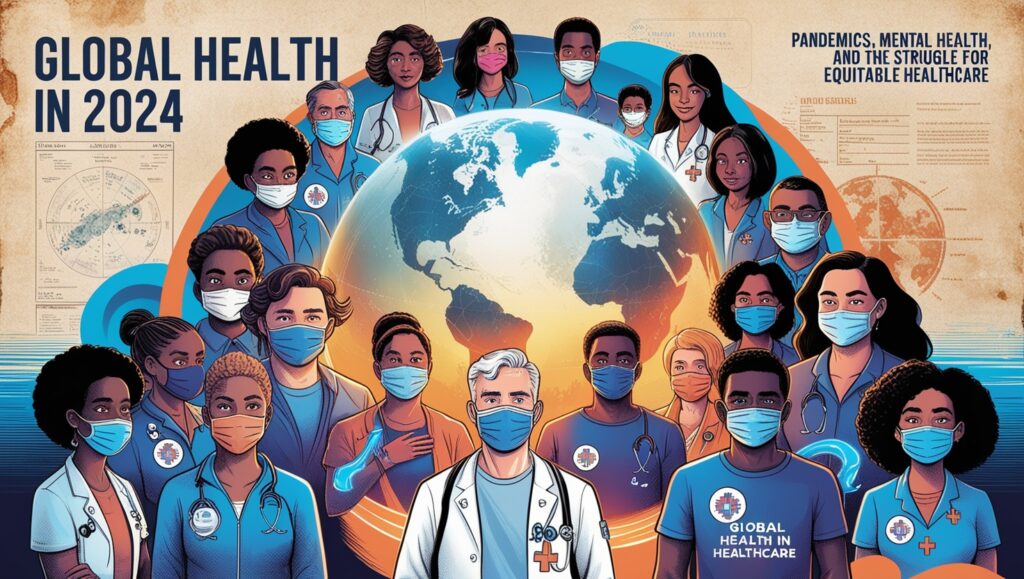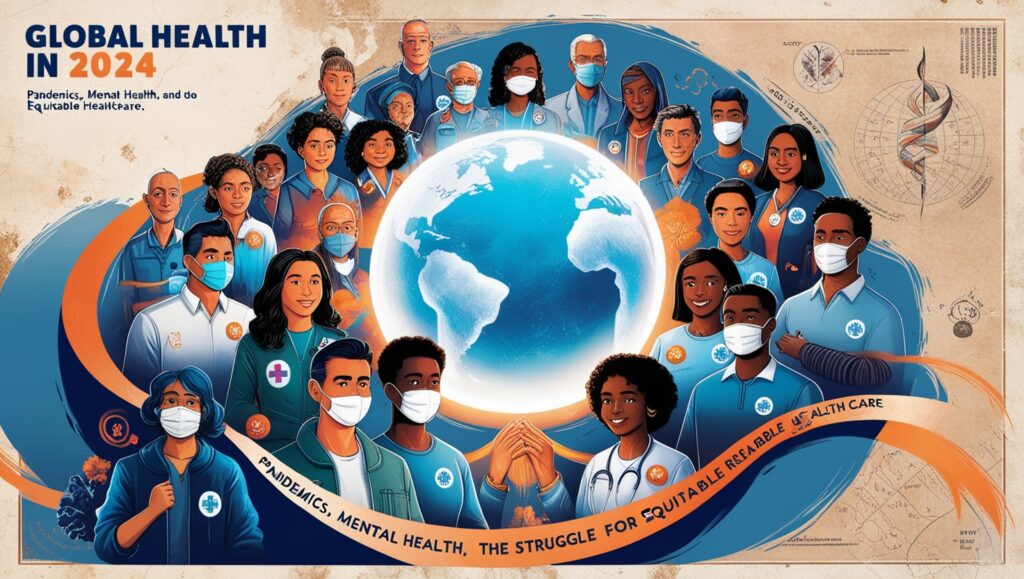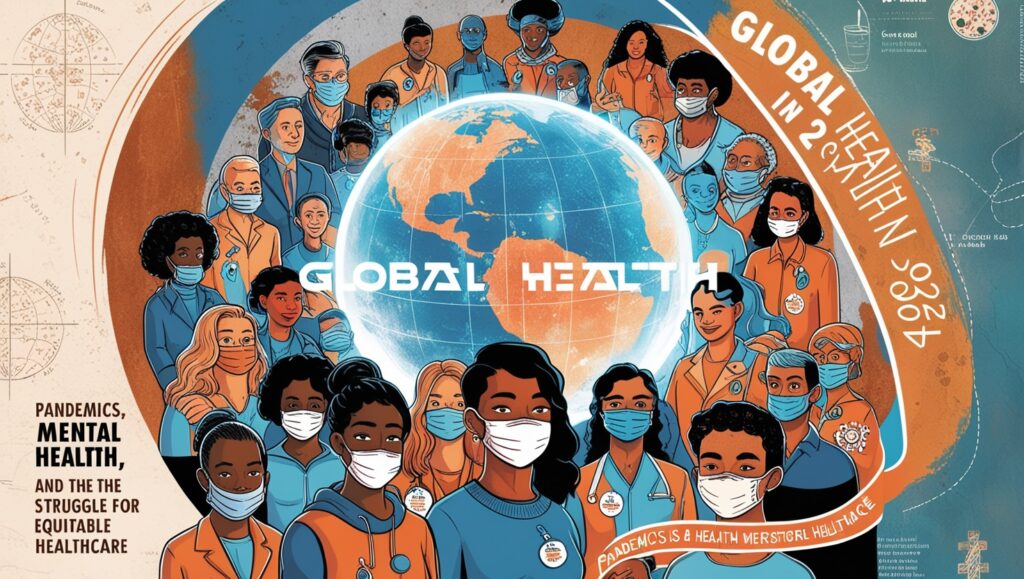Global Health in 2024: Pandemics, Mental Health, and the Struggle for Equitable Healthcare

The global health landscape in 2024 is defined by three significant and interconnected issues: the ongoing impact of pandemics, the growing mental health crisis, and the struggle for equitable access to healthcare. The COVID-19 pandemic has reshaped our approach to public health, highlighting systemic vulnerabilities, the importance of timely interventions, and the need for global collaboration. At the same time, mental health challenges have surged, exacerbated by isolation, economic stress, and the lingering effects of the pandemic. These challenges are set against a backdrop of persistent inequalities in healthcare systems, where access to quality care remains a struggle for millions of people worldwide.
As we navigate the complexities of global health in 2024, it is essential to examine the ongoing ramifications of the pandemic, the mental health crisis, and how we can work toward creating a more inclusive, accessible, and resilient healthcare system for all.
1. The Legacy of the COVID-19 Pandemic and Future Preparedness
Even though COVID-19 may no longer dominate daily headlines in many countries, its long-term effects are far from over. As we emerge from the acute phase of the pandemic, we continue to deal with its consequences—public health, economic disruptions, and the strain on healthcare systems. However, the lessons learned from the pandemic are shaping how we prepare for future health emergencies.
a. Pandemic Preparedness and Surveillance:
The pandemic underscored the importance of global surveillance systems and early detection of infectious diseases. In 2024, governments, the World Health Organization (WHO), and international public health agencies are focused on strengthening global health security through improved data-sharing, the development of rapid-response vaccines, and international cooperation. The lessons of COVID-19 emphasize the need for preparedness at all levels—local, national, and global—so that future outbreaks can be addressed swiftly and effectively.
b. Ongoing Vaccination Efforts:
Despite the success of COVID-19 vaccines, significant gaps in vaccine distribution and access remain. While wealthy nations have largely vaccinated their populations, low- and middle-income countries continue to face challenges in acquiring sufficient vaccine doses. Efforts to ensure that vaccines and other public health interventions are available globally, equitably, and quickly remain critical in preventing future pandemics and saving lives.
c. Long COVID and Post-Pandemic Health Issues:
Long COVID has emerged as a significant issue, with millions of individuals experiencing prolonged symptoms well after their initial infection. The medical community is still working to understand the long-term effects of the virus, which may include chronic fatigue, respiratory issues, and neurological symptoms. The long-term health impacts of COVID-19 demand a comprehensive and global approach to healthcare recovery, including research, treatment, and support for those affected.
2. Mental Health Crisis: A Global Emergency
Mental health has emerged as one of the most pressing global health challenges of the 21st century. The pandemic, with its isolation, economic uncertainty, and constant stress, has exacerbated mental health issues for millions. However, the mental health crisis was not born out of COVID-19—it only highlighted and amplified existing vulnerabilities in mental health care systems worldwide.
a. The Impact of the Pandemic on Mental Health:
According to the World Health Organization (WHO), the pandemic led to a 25% increase in anxiety and depression worldwide in 2020, with numbers continuing to rise in subsequent years. Lockdowns, loss of income, fear of illness, and grief from the death of loved ones have left deep psychological scars. Social isolation has also contributed to rising levels of anxiety, depression, and substance abuse.
In 2024, as countries grapple with the aftermath of the pandemic, the focus is on mental health as a critical component of overall health and well-being. Governments and health organizations are increasingly recognizing that addressing mental health is essential to building a resilient population.
b. Access to Mental Health Services:
Despite growing awareness, access to mental health care remains a major barrier for many people. In low- and middle-income countries, mental health services are underfunded, and the stigma around mental illness often prevents individuals from seeking help. Even in high-income countries, there are significant disparities in access to mental health services, with long wait times, limited insurance coverage, and insufficient availability of trained professionals.
In 2024, initiatives are emerging that focus on integrating mental health services into primary healthcare settings and expanding digital mental health services through teletherapy and mobile health apps. These approaches aim to make mental health care more accessible and reduce the stigma surrounding mental illness.
c. Workplace Mental Health:
The workplace is a critical area for addressing mental health, especially as more people work remotely or in hybrid settings. Remote work has introduced new challenges related to isolation, burnout, and maintaining work-life balance. Employers are beginning to take a more active role in supporting the mental health of their employees, offering benefits such as mental health days, employee assistance programs (EAPs), and wellness initiatives.
3. The Struggle for Equitable Healthcare: Access and Inequality
In 2024, one of the most critical global health issues is ensuring equitable access to healthcare. While the world has made tremendous strides in medical advancements, billions of people still lack access to quality health services. Healthcare inequality remains a significant issue, particularly in low- and middle-income countries, where access to essential services is limited by factors such as cost, geography, and infrastructure.

a. The Global Health Divide:
The disparity between wealthy and poor nations in terms of healthcare access is stark. While many high-income countries enjoy universal health coverage and advanced medical technologies, millions in low-income nations lack even basic healthcare services. According to the WHO, over half of the world’s population still lacks access to essential health services, and many are forced to pay out-of-pocket for care, often leading to financial ruin.
The COVID-19 pandemic exacerbated these disparities, as poorer countries struggled to access vaccines, treatments, and medical supplies. As we move into 2024, there is an urgent call for global cooperation to ensure that all countries, regardless of income, have access to essential healthcare services.
b. Universal Health Coverage (UHC):
In response to these inequities, the global community is increasingly focused on achieving Universal Health Coverage (UHC)—ensuring that everyone, everywhere, can access the healthcare they need without suffering financial hardship. Many countries have made significant progress in expanding health coverage, but much work remains to be done to address gaps in access, particularly in rural and underserved areas.
c. The Role of Technology in Expanding Access:
Advancements in health technology, including telemedicine, mobile health apps, and AI-driven diagnostics, are helping to bridge gaps in healthcare access. These tools allow people in remote areas to access consultations and treatments without having to travel long distances. Additionally, AI and machine learning are making it easier to diagnose diseases earlier, improving outcomes for patients in under-resourced areas.
In 2024, digital health innovations are being hailed as a key solution to the global health divide, but their implementation must be inclusive, ensuring that marginalized communities are not left behind.
4. The Way Forward: Building Resilience and Equity in Global Health
To address the challenges of pandemics, mental health, and healthcare inequality, it’s essential to adopt a holistic, systems-based approach to health. Public health initiatives must be coordinated at the global, national, and local levels, with a focus on equity, sustainability, and resilience. Here are some key strategies for moving forward:
a. Strengthening Health Systems:
Investing in healthcare infrastructure, particularly in low-income regions, is crucial for improving health outcomes. Governments and international organizations must work together to build resilient healthcare systems capable of responding to both routine and emergency health needs.
b. Collaborative Global Health Initiatives:
Global health challenges require global solutions. Collaborative initiatives like COVAX (which aimed to ensure equitable vaccine distribution) are essential for tackling health crises. Continued global cooperation is necessary to address emerging health threats, share research, and distribute resources equitably.
c. Tackling Social Determinants of Health:
Health is not only determined by medical care but also by factors like education, income, housing, and access to clean water. Addressing the social determinants of health is key to improving health outcomes and achieving equity.
d. Promoting Mental Health Awareness and Services:
Governments, employers, and communities must prioritize mental health as a fundamental aspect of public health. Expanding access to mental health services, reducing stigma, and integrating mental health care into general healthcare are essential steps toward creating a mentally resilient population.
5. Conclusion: A Call to Action for Global Health Equity
The global health landscape in 2024 presents a mix of challenges and opportunities. While we continue to battle the lingering effects of the pandemic, we also have the chance to build a more resilient, equitable, and inclusive healthcare system. By addressing mental health, improving access to healthcare, and ensuring global cooperation in times of crisis, we can work toward a healthier, more equitable world. The time for action is now—together, we can create a future where health is a universal right, not a privilege.

Cover Photo Prompt:
“An image of healthcare workers from diverse backgrounds working together in a hospital setting, juxtaposed with a community-based health initiative, such as a mobile clinic in a rural area. The photo should convey a sense of global cooperation, resilience, and commitment to equitable healthcare access for all.”
Suggested Tags:
- #GlobalHealth2024
- #PandemicPreparedness
- #MentalHealthAwareness
- #EquitableHealthcare
- #UniversalHealthCoverage
- #HealthForAll
- #GlobalHealthInequality
- #DigitalHealthInnovation
- #PostPandemicRecovery
- #HealthcareAccess






